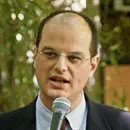
A few months after the German city of Frankfurt elected Peter Feldmann as its first Jewish mayor since the rise of Adolf Hitler, the city council awarded a prize to a Jewish anti-Zionist activist, Judith Butler.
The city of Jacob Hoffmann, Franz Rozenzweig, the artist Moritz Oppenheim, the world-renowned chemist Paul Ehrlich, and many other Jews who brought glory to Frankfurt before the Nazi shame, decided to honor a feminist who has been busy for a decade in the demonization of Israel.
Surprised?
Judith Butler, the professor of Comparative Literature at the University of California who promotes a cultural boycott of the Jewish State, is one of the new Jewish Marxists who have turned anti-Zionism into one of their very highest priorities.
In recent years, the most unremitting criticism of Israel has come from Jewish intellectuals. These liberal Jews are more dangerous than the Islamists. Many of Israel's worst enemies have indeed been, in William Blake's words, "those of our own house and family". Peter Beinart is another proof that Jews are just as capable of voicing anti-Semitic statements as non-Jews.
Last year, then-German president Horst Kohler issued the Federal Merit Cross, one of the country’s most important awards, to the Jewish lawyer Felicia Langer, who has equated Israel with Nazi Germany.
Evelyn Hecht-Galinski, whose father survived Auschwitz and became the first chairman of the Berlin German Jewish community following the Holocaust, has applauded parallels drawn between Israeli policies and Nazism.
Here are more: George Steiner, who questioned whether Israel should have come into being at all; Eric Hobsbawn, who supported the Intifada, endorsing “the cause of liberation"; Marek Edelman, one of the leaders of the Warsaw Ghetto Uprising, who wrote letters to “Palestinian partisans” during the Intifada; the late historian Tony Judt, who had been outspoken in his rejection of Israel’s right to exist; and United Nations envoy Richard Falk, Nobel laureate Harold Pinter, the linguist Noam Chomsky...
But what is most disturbing in the Butler affair is not only that the prize's recipient is an anti-Israel agitator, the version of the old Kapò; it is the role played by the new "Judenrat".
In 2012's, Europe, where Jews are gunned down, the rabbis attacked in the streets, the Israeli goods disappear from the supermarkets and the universities boycott professors because of their Israeli passport, a Jewish mayor of a German city gives an award to a self-declared anti-Zionist.
It's the same city of Frankfurt which invited Alfred Grosser to deliver a speech at commemoration of Kristallnacht. Grosser has compared his treatment by the Nazis in the early 1930s with Israel’s policies toward the Palestinians.
How many Jewish columnists and personalities came out to defend Günter Grass, the Nobel Prize laureate who published an anti-Israel poem, from Netanyahu's decision to ban him?
A special Financial Times’ survey has shed light on Grass’ popularity. Given the question “The statements by Grass are…”, only the 8% answered “dangerous” and “anti-Semitic.” Some 57% said “correct” while 27% said “worth discussing/arguable". The total figure of respondents who see Grass’ incitement against Israel as correct or arguable is 84%.
German public opinion loved the poem, because Grass fanned the flames of their Jew-hatred in a very comfortable way. Who’s better than the “conscience of Germany,” the former Heinrich Himmler volunteer, the most famous anti-fascist to indict the post-Holocaust Jews?
The most fiendish aspect of the Nazi war on the Jews was the scheme to dupe the Jews into cooperating in their own destruction. To this end, the Nazis made use of the leadership in the Jewish communities, whom they constituted as the Judenrät - the Council of the Jews. They implemented the Final Solution.
Today the new Judenrat all over Europe cast Zionism as the cause of anti-Semitism, see the bombing of a synagogue in Lyon as a reprisal for an Israeli incursion into Gaza and declared "lslamophobia” the worst racism. The new Judenrät says "Occupation is Oppression" and condemns "the violence of the suicide bombers" but also "the violence of military incursions and reprisals".
The new Judenrät's heads are the likes of Alfred Nossig, writer, sculptor, pre-Herzlian exponent of Zionism. After the Germans established the Warsaw Ghetto and the Judenrat, they ordered the chairman, Adam Czerniakow, to appoint Nossig to it.
In 1943, the Jewish underground convicted Nossig on charges of collaborating with the Hitlerists and executed him. It's a tragic story which we must judge with compassion as well.
Abba Kovner, the poet and a heroic survivor of the resistance, reported in a book published in 1981, On a Narrow Bridge, that in a conversation he had with him, Nathan Alterman said: "Had I been in the ghetto, I would have been with the Judenrat".
Like Czerniakow, the new "Judenratters" don't hate the Jewish people whom they sacrifice. They believe that, by giving up some of the Jews, they would save others.
In Israel Yitzhak Rabin, Shimon Peres and Ariel Sharon carried on the tradition of the Judenrat by offering some Jews for transportation out of Gush Katif and Samarian settlements in order to find favor in the eyes of the West.
The ghetto walls have fallen. But a new generation of Jews, like mayor Feldmann, has grown at the court of the new Europe's rulers. By awarding people like Butler, they offer Europe's Jews a sort of baptism.
If conversion to Christianity was the ticket out of the ghetto in the Middle Ages, conversion to anti-Zionism is the trick they hope will work today. But like in Europe's Judenrät, in the semi-Islamicized Europe there is no other trick than the final disappearance of the Jews.
As the Americans did during the Holocaust, the Europeans will ignore the daily quota of Jews. Anti-Semitism knows no quibbles.
